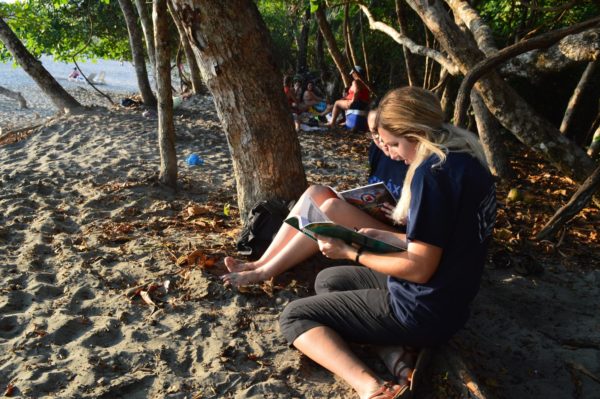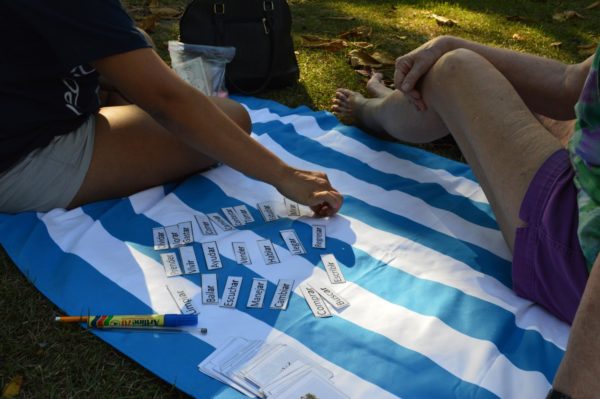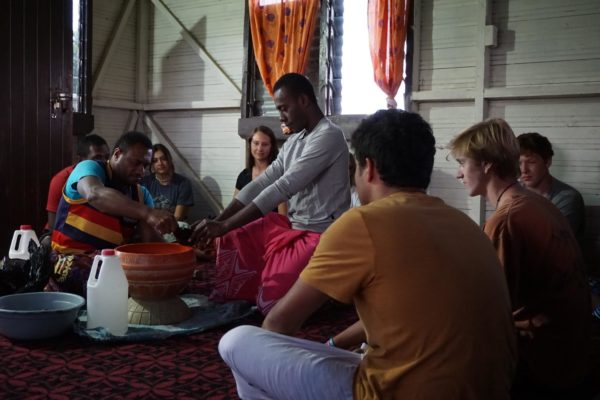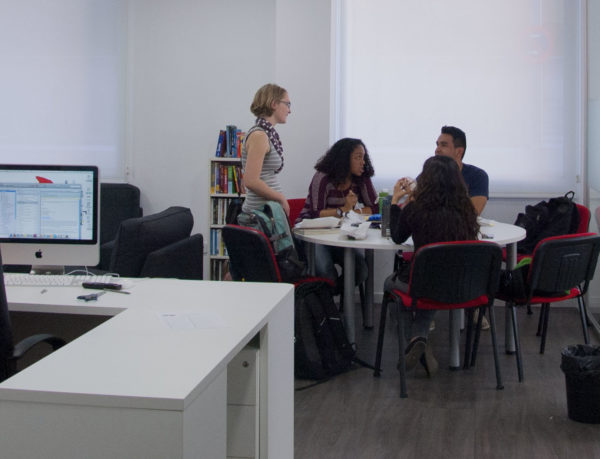
Fall 2019 students on the Verto Latin America semester compare language learning notes from class in their favorite study spot – the beach!
I remember when I first started learning a second language. It was Spanish, and I was a sophomore in high school. As things started to click in place, I realized that Spanish was opening a whole new world that had previously been unknown to me – a world of people, cultures and travel. Every language has words and expressions for concepts that don’t exist in other languages. So by learning another language, I was actually expanding the way my brain thinks – how powerful is that?! The second language requirement at my school kicked off a lifetime of travel and a love of cultures that is still going strong today.
One thing’s for sure – learning a language isn’t easy. And the plethora of apps, methods and courses doesn’t make it simple to figure out the best way to tackle the challenge. To shed some light on the subject, I decided to interview a friend of mine who is a language expert. Imma Cabotí speaks Catalan, Spanish, English and Portuguese and is currently improving her French. She was born in a coastal town near Barcelona and has spent most of her life working in languages – as a freelance translator and a Spanish and English language coach. Imma and her British husband have lived in London, the United Arab Emirates and the US. She is currently a Spanish language coach for Rosetta Stone and lives with her multilingual, multinational family in Falls Church, Virginia.

Students on the Verto Latin America semester take a unique approach to improving their Spanish language skills in a group study session.
Do you recommend using free resources, paying for classes, or both? Which resources do you recommend?
If you are traveling and going to be immersed in a new language, it helps to have some previous knowledge of that language. Knowing at least “the basics” will minimize the linguistic shock and you will feel more confident and ready to embrace and enjoy the new experience. You will also become fluent quicker and take more advantage of the whole stay.
There are a variety of language courses on the market with different approaches to language acquisition. For example, Rosetta Stone, for which I work as a Spanish language coach, recreates an immersion experience, so it uses repetition and visuals to help your brain internalize the new language. Other language teaching companies teach a language by translating it to and from another like, for example, Duolingo. Some courses concentrate on only speaking and listening skills while others are more well-rounded.
Most language courses require payment but there are some free apps that give you the option to pay for an upgrade, an ad-free experience or added features. It is worth looking around as in general, most companies have good offers! For example, Rosetta Stone, because of the confinement, is offering a 3-month free subscription for students.
If you have the time, using more than one language learning method is actually super interesting and advisable, as different methods can be complementary. I am currently doing it myself as I am improving my French, using Rosetta Stone and Duolingo. The most important thing is to find as many opportunities to work on your new language as possible. Be consistent, patient and keep motivated. You can do it!
Not only do language courses provide an opportunity to practice, there are plenty of other resources, particularly useful for intermediate and advanced learners: Streaming movies in the new language (using captions to help you understand); newspapers (if you will be moving to Spain I recommend eldiario.es or El Huffington Post), radio (radio nacional de España has an app “rne”) or tv (“rtve” is the public tv channel in Spain). Do not try to understand everything at first. 10-15 min a day should be enough to start with, unless you are already proficient!
How can students focus on the right phrases for “survival” language skills?
Most of the courses I have mentioned start with basic and survival lessons such as asking for directions, ordering food, making hotel reservations etc. Otherwise, just search “survival (language you are learning)” on the internet and you will find many mini-lessons online by a variety of linguists, students and intrepid travelers! Make sure you practice them by memorizing and concentrating on the pronunciation until you gain confidence. Study in chunks, for a short period, -if you can- every day. That will also help you gain confidence.

You don’t need to be fluent in a language, but having a basic understanding of a few common words can help you connect with the hosts’ customs and traditions, like these Verto students taking part in a ceremony in Fiji. There are even online resources for learning Fijian!
When I first travelled abroad to Madrid, Spain, I was so excited about the new experience, but I was so shy and afraid of making mistakes. My hesitancy prevented me from interacting very much with Spanish people, so I ended up mostly hanging out with my American friends from my university. Fast forward several years to my first international job living in Panama. My Spanish had only slightly improved, but what had changed significantly was my willingness to put myself out there and make mistakes. I was on a team of folks from all over Latin America. As a result of my newfound courage, I made great friends and had the time of my life. I traveled to Costa Rica with my Mexican friend, Aruba with my Argentinian friend, and my Brazilian friend invited me to spend a week during Carnival with her in Rio de Janeiro! Do you have any examples of how language learning – or at least trying – can help students engage with the local community and make different connections?
Learning a new language before moving abroad will accelerate your language acquisition. Once you get to the new country the more you already know, the easier it will be to interact with the locals. Engaging with the community will not only help you improve your language, but you will gain a very valuable understanding of the new culture and it can be quite fun. If you get the chance to use resources like tv, press or radio before your departure, it will help you to get acquainted with what locals are worried/talking about so when you arrive to the country, it will be easier to participate in the conversations as you will have cultural references. Once you get there, do make an effort to meet local people. Most people find the opportunity enriching and will love to help you! Join sports teams, community or group activities, clubs and keep an eye on opportunities to interact with native speakers. If at first you find it hard making new friends, look for people interested in practicing English and set up a coffee & “language exchange” conversation session. You will be surprised how many people take you up on that.
Any tips for overcoming frustrations when learning a second language?
Keep telling yourself that learning a new language is HARD. I loathe those advertisements that tell you “Learn Spanish in two weeks”. It is deceitful and sets you up to fail. You must not be scared of making mistakes. Relax, work hard and persevere. It is also useful if you can stick to material that is a bit challenging but at the appropriate level. I remember trying to read The Lord of the Rings when I had only studied English at school (and badly) in Barcelona for a few years. It was a disaster and I felt so discouraged. You need to find materials at your level. You will get there! Lord of the Rings is now one of my all-time favorites! Those years ago I failed to read it because I was being too ambitious and had unrealistic expectations! This is the reason why to use a language course could be very helpful. Learning programs help you build up your knowledge gradually and guide you through the process.

Learning a new language can be hard! But thankfully you’ll have lots of support from instructors along the way and can form study groups with your peers, like these students in the study center in Spain.
Any other words of advice?
Confidence is an important element of language acquisition. It has a little bit to do with the learners’ particular individual skills and introverted/extroverted personality, but ALL types of learners get there eventually, so do not worry!
Practice makes perfect but also remember that making mistakes is a necessary part of the learning process, so go for it! As I said, be consistent, patient and keep your motivation levels up.
Spending time in a country where another language is spoken is a unique life experience. If I were Secretary for Education I would make it compulsory for everyone, at least once in their lifetime! If you are given such an opportunity, do not hesitate, take it and enjoy your adventure.

